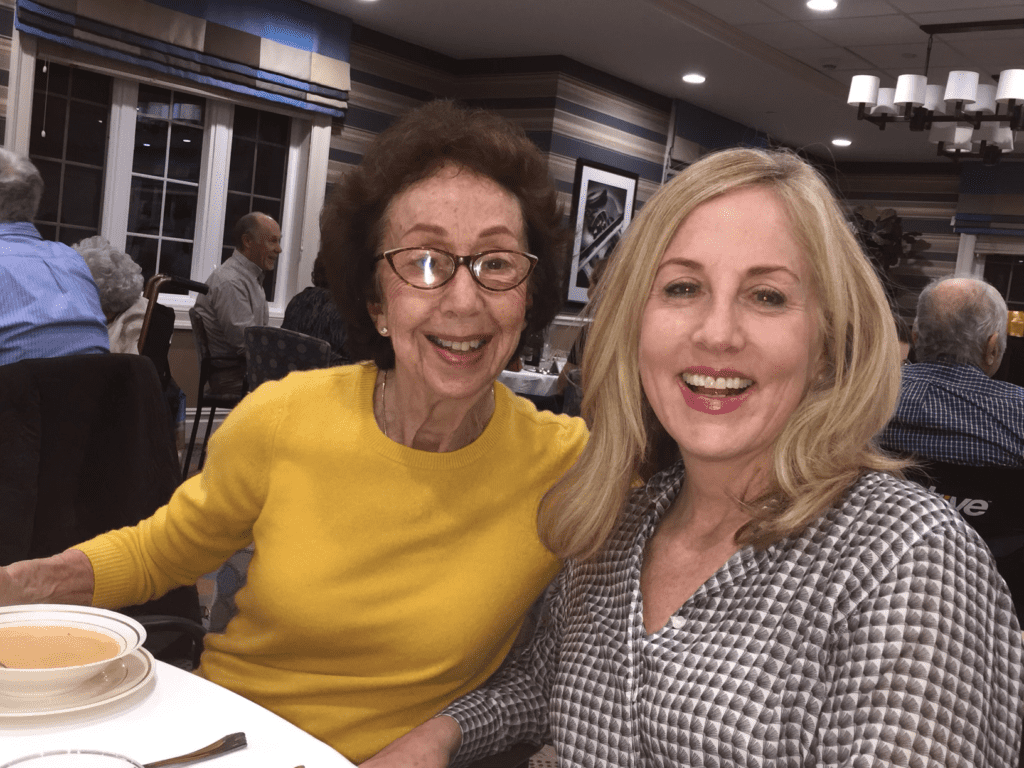
Gwen Farassat of Mamaroneck said that she and her brother, David Factor of Chappaqua, first realized that their mother, Sally Factor, was experiencing cognitive changes when she began having difficulty with finances.
A former real-estate broker from the Boston area, Sally Factor had lived an independent and dynamic life with many friends and activities. Widowed at 49, she put both of her children through college and traveled extensively after her husband’s death.
“She was a dynamo. I would visit my mother at home, and when we would walk in the downtown area — everyone would know her; she always had lots of friends. She was always petite and energetic,” Farassat recalled.
After retirement, Sally Factor moved to Heritage Hills in Somers to be closer to her children and grandchildren, where she lived for 14 years. There, she continued to live an active life while volunteering in the community.
“She played golf several times a week. She was very philanthropic; she would drive people to doctor’s appointments who couldn’t get there. She helped people cope with cancer diagnoses later in life when she had more free time.”
But when Sally Factor didn’t file her taxes, Farassat and her brother realized something was off.
“She had an accountant who would send a checklist every year, and my mother didn’t do it. That wasn’t like her,” she recalled. “She was initially diagnosed with MCI (mild cognitive impairment), probably six years ago. That’s when my brother and I noticed that she was having some difficulty — but she was still able to take care of herself.”
But eventually, about two years later, they began noticing some disturbing signs. Sally Factor’s microwave door had been mysteriously burned, and her refrigerator was never full.
“We got concerned about her safety living alone, driving. She wasn’t cooking meals for herself, she wasn’t eating; her weight had gotten really low. Her refrigerator was always empty unless we brought her food.”
So three years ago, they moved her to an assisted living facility.
“It was actually a really great fit for her at the time,” Farassat recalled. “It provided the oversight and assistance she needed, but at the same time, she had her own apartment. She could pick and choose the activities she did.” But during COVID, her condition worsened, and eventually the choices and independence of the assisted living became a source of anxiety rather than a benefit. Suddenly all the choices had become overwhelming.
“My mother had anxiety and frustration. ‘Something’s going on here,’ she would tell me. She didn’t feel comfortable, she was overwhelmed, and she had trouble putting it into words.” At that point, they moved her to a memory care unit.
Farassat said the COVID-19 pandemic likely took a toll on her mother’s decline because of the isolation it forced on the assisted living residents.
“Early on in the pandemic, the residents were almost isolated in their rooms — they were having meals in their rooms. For someone suffering from dementia, I think it was torture. We’ll never know how much the decline that occurred during the pandemic was just the natural course of the disease and how much it might have been sped up by the isolation. And then when they did have things had things under control, they had a visitation room where we could schedule a visit for 45 minutes. We had to sit a certain number of feet apart wearing a mask. It wasn’t very personal.”
During November, which is National Family Caregiver Month, the Alzheimer’s Association recognizes the impact of caregiving and honors the more than 11 million Americans caring for someone with Alzheimer’s disease. Some of these caregivers may not even think of themselves as caregivers. Farassat said she was initially in this category.
“Originally, I didn’t think of myself as a caregiver,” she said, because she doesn’t actually administer her mother’s daily care. But as she became more involved with the Alzheimer’s Association, she learned the role can take many forms. She said it has been hard watching her mother decline and knowing there is no way to stop it.
“One of my kids gets sick, and I‘m going to take them to the doctor and get to the bottom of it, but I can’t do that with my mother. I can’t change the course of the disease; that’s frustrating and sad. I’ve taken that negative energy and am putting it into something positive by turning it to the Alzheimer’s Association. There is something comforting when other people are experiencing something similar to what you are. That’s one part. The other part is raising the money for the research, services and care.”
This year she started a team for the Westchester Walk to End Alzheimer’s, Sally’s Soldiers, which raised more than $10,000. She also joined the walk planning committee as co-Mission Chair, a role she plans to continue solo in 2022. She says she finds the work fulfilling.
“I couldn’t be more proud of my team,” she said. “Once I got involved, and started doing the fundraising, it’s amazing how many people have been touched in some way by dementia.” She said that was a factor in her team’s fundraising success. “I love the work that I’ve been doing, I love the people I’ve been meeting. It’s been really helpful to me, just to try to give back.”
About the Alzheimer’s Association
The Alzheimer’s Association leads the way to end Alzheimer’s and all other dementia — by accelerating global research, driving risk reduction and early detection, and maximizing quality care and support. Its vision is a world without Alzheimer’s and all dementia. Visit alz.org
To learn more about the programs and services offered locally, visit alz.org/hudsonvalley.





